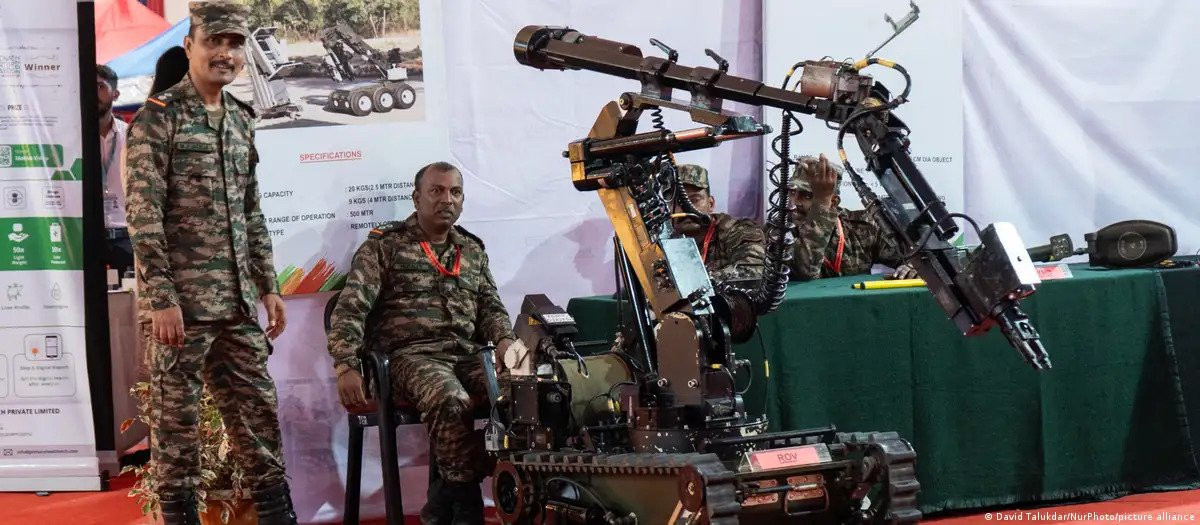Indian army ramps up AI, but how effective will it be?
Artificial Intelligence is shaping India's defense landscape, providing a potential advantage in operations while also enhancing border security

With one eye on enhancing its operational capabilities, the Indian Army has been deploying Artificial Intelligence (AI) surveillance systems along its borders with Pakistan and China.
Officials pointed out that the army has deployed 140 AI-based surveillance systems, which include high-resolution cameras, sensors, unmanned aerial vehicle (UAV) feed and radar feed. These are then collected and applied through AI, all in the name of detecting intrusions at borders while classifying targets.
Increasing deployment of AI
AI-based real-time monitoring software has also been deployed for generating intelligence in counter-terrorist operations.
The army has also begun leveraging hi-tech military simulator technologies to train its first batch of recruits, a trend that is likely to mark its prevalence across military training in the near future.
"AI can be a game-changer in logistics, information operations, intelligence collection and analysis," a senior defense ministry official told DW. "Though India's adoption of military AI technology is relatively recent, we have made substantial progress in launching AI-enabled military devices."
Using AI-powered drones and robots to patrol borders provides increased coverage and reduces the need for human intervention in dangerous situations.
The Indian military is also looking to harness the potential of AI and Defense Minister Rajnath Singh launched 75 newly-developed AI technologies during the first-ever "AI in Defense" symposium last July where products like robotics, automation tools and intelligence surveillance were on display.
The United States and India have also agreed to launch an inaugural Defense Artificial Intelligence Dialogue and expand their joint cyber training.
Early this year, at Aero India, one of the largest air shows in Asia, an AI-based surveillance software called AGNI-D was unveiled for surveillance and thwarting transgression. It is deployed in the eastern Ladakh sector, a region of strategic importance due to its closeness to China.
The software can recognise any movement, weapons, vehicles, tanks, or missiles captured by army surveillance cameras, both live and recorded. With advanced algorithms, the AI-based system analyses video footage and identifies movement along the border, alerting soldiers of suspicious activity.
Effect on the tools of warfare
According to the Delhi Policy Group, a security think tank, the Indian military is allocating approximately US$50 million (€ 47.2 million) for AI spending each year.
"This is a good initial step, but clearly inadequate compared to our primary strategic challenger, China, which is spending more than 30 times this amount. If we are not to fall behind the technology cycle, greater investments will have to be made, primarily to promote the indigenous industry players," the DPG said.
Though both the US and China have taken the lead in AI research and technology, integrating cutting-edge innovations into their defense systems, India is also playing catch-up. Nevertheless, New Delhi is trying to position itself at the forefront of intelligent warfare strategies.
"From border control to comprehensive surveillance and drones equipped with AI-based aircraft technology that excel in performing day and night reconnaissance missions, India realises, like other militaries around the world, the importance of integrating AI into war-fighting systems," Lt General Shankar Prasad, a defense analyst, told DW.
Can human intelligence be ignored?
However, Prasad pointed out the limits of even the most advanced and invasive surveillance systems, citing the surprise attack on Israel by terror group Hamas on October 7, which has now erupted into a full-scale war.
"This is a hard lesson that must be learnt by us. Israeli surveillance and intelligence is amongst the most sophisticated. Yet they failed to detect the sneak attack and were not given any early warning signals," said Prasad.
His views were echoed by the Lt General P R Kumar, a former Director General of Military Operations, who believed that human intelligence was required to interpret data garnered from AI solutions.
"When it comes to counter-insurgency and counter-terrorism measures, there are no black and white situations," Kumar told DW. "Electronic eavesdropping on communications or AI data cannot provide the cutting edge, especially when human activity is hard to interpret."
"One can have innovative military capabilities but humans need to interpret and read this data to be useful," added Kumar.
A recent report published by the Delhi-based Observer Research Foundation, an independent global think tank, pointed out that all three services of the defense ministry understood the significance of technological innovations in modern warfare, although its development has been uneven across the branches.
"The Indian armed forces are gearing up to incorporate emerging technologies in the services. However, there are challenges confronting the Navy, particularly the lack of sufficient organic talent on AI that can credibly identify the areas of application," the report said.
While deploying high-tech solutions has minimised the involvement of humans in monitoring and eases the spotting of intrusions in remote areas along the country's borders, its adoption has many challenges that need to be overcome to fully utilise its potential.
AI a must in modern defense
Lt General Ravi Sawhney, who retired as the deputy chief of army pointed out that AI is among the many capable technologies that promise to change the face of warfare in the coming years.
"It is now at a stage where defense services that do not adopt AI will be rendered technologically poorer. The problem is collecting and analysing information can be a time-consuming process," Sawhney told DW.
"However, what is important to know is that greater reliance on AI for military power will make the human element in war even more important, not less," he added.

Murali Krishnan is a correspondent for Deutsche Welle.
Disclaimer: This article first appeared on DW, and is published by special syndication arrangement.


 Keep updated, follow The Business Standard's Google news channel
Keep updated, follow The Business Standard's Google news channel















